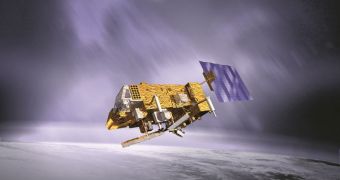Officials at the European Space Agency (ESA) announce that they are now ready to support the launch of the latest meteorology satellite, called MetOp-B. The vehicle is the second in a series of three spacecraft dedicated to studying Earth's weather and climate.
Launch is currently scheduled to occur on September 17, from the Russian Federal Space Agency's (RosCosmos) Baikonur Cosmodrome, in Kazakhstan. MetOp-B will be delivered to orbit aboard a Russian-built Soyuz rocket.
ESA is in charge of constructing and launching the spacecraft under a contract signed with the European Organization for the Exploitation of Meteorological Satellites (EUMETSAT), which will take over satellite operations after the orbital testing and commissioning phases are completed.
At this time, ESA engineers are carrying out a series of simulations dealing with the first 72 hours of MetOp-B operations. This interval is considered to be critical to the overall success of the mission.
The spacecraft carries a series of instruments developed by a consortium of companies, led by Astrium. CNES (the French space agency) and the US National Oceanic and Atmospheric Administration (NOAA) also contributed some assets to the satellite.
Engineers say that the LEOP (launch and early orbit phase of the mission) will begin around 3 minutes after takeoff, and last for three days. Its beginning will be marked by the separation of the satellite from the Soyuz's Fregat upper stage.
“On Day One, we’ll look for solar array deployment and activate a number of systems, and on Day Two, we’ll deploy five payload instrument antennas,” explains ESA flight operations director, Hervé Côme, who is based at the European Space Operations Center, in Germany.
“On Day Three, we’ll conduct a number of thruster burns to fine tune the orbit and get into ‘phase’ with the orbit of MetOp-A while we prepare for handover to EUMETSAT,” the official goes on to say, adding that the first signals from the satellite will be received 66 minute after launch.
MetOp-B will be launched into a polar orbit around the planet, which will enable extremely sensitive observations of the atmosphere, oceans and the ground. This is the same orbit used by spy satellites.

 14 DAY TRIAL //
14 DAY TRIAL //